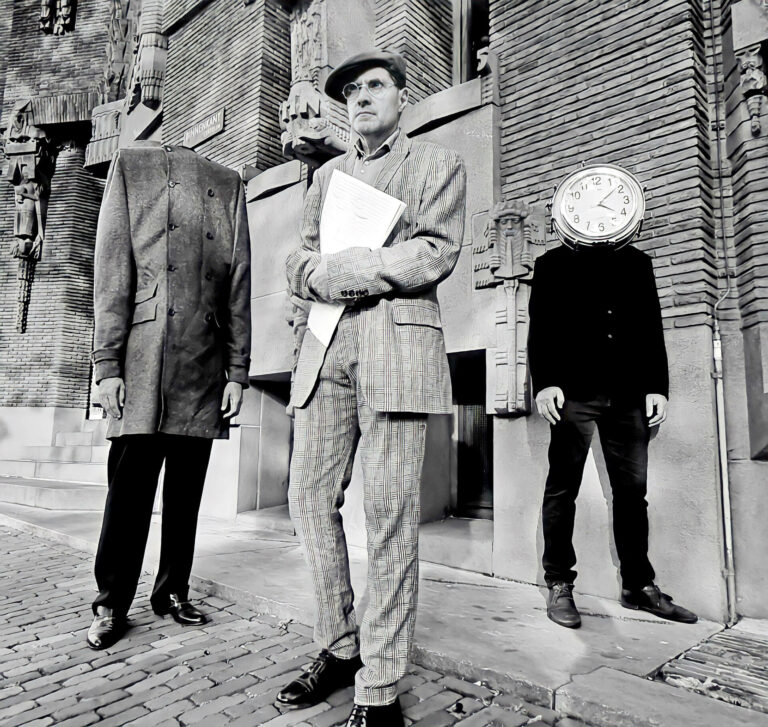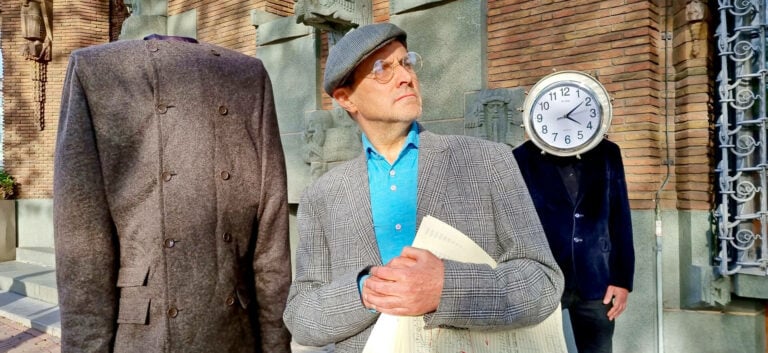Constantine Koukias left Hobart nine years ago for Amsterdam. He is back to premier his new work Deep Black Sheep for MONA FOMA festival in a fortnight.
Deep Black Sheep is a film noir opera about a composer in an undisclosed authoritarian state, it weaves live vocals and performance with film and smears the line between live performance and cinema. In the work, Koukias asks the question, what price of artistic freedom? “The composer has a commission in an unknown, time, and space,” says Koukias over from Amsterdam.
“One singer carries the whole piece and there are five musicians behind the wall, and they appear out of a door, the audience don’t realise until the end of the opera, that it’s the musicians, when they’re not playing, all choreographed who come out in an absurdist tableau.”
Koukias may have sparked Hobart’s transformation through IHOS Music Theatre and Opera, a company he co-founded in the early 1990s. Koukias led a small group transgressive – queer, and straight culturally diverse creatives – in a what was a then a parochial Hobart.
It was a time when the island city had more hunting and camping supply shops than cafes, wine bars, and restaurants – galaxies away from the international, food and arts Mecca it is now. A time long before the Museum of Old and New Art (MONA) transformed Hobart.
Yet, in this old conservative Hobart Koukias produced imposing contemporary opera theatre. Works like Days and Nights with Christ, To Traverse Water, MIKROVION an opera about AIDS, and The Divine Kiss on subjects like migration and identity, AIDS, sexuality – underscored by Byzantine infused music, Orthodox religious motifs, and contemporary classical librettos.

In Deep Black Sheep Koukias draws from European existentialism, Dada, and absurdism. “One actor has a clock for a head, another is headless, and others are flowerpot men.”
“The premise is that there is a shooter out there, an outside danger, and the state has for the sake of ‘safety’ imposed itself on all,” he says. Fear reigns.
“You don’t know if the composer is in Soviet times, or our world – it’s timeless and you don’t know what’s going on.”
“Someone is looking over the shoulder of the composer, and then you could see up on the wall what he’s writing, there is constant surveillance the composer is living under.”
He is wedged between his artistic values and expediency in an authoritarian climate. Intellectual engagement becomes another form of conformity. It is in essence about self-betrayal.
“It is a moral tale, or a cautious style about what happens when we negate our freedoms.”
“And we can no longer tell what’s truth and what’s not, there are conspiracy theories impacting on us, and our phones are almost a surveillance camera,” he adds.
Koukias alludes to the way sports, and entertainment gloss over authoritarianism. The recent FIFA World Cup being hello Qatar is an example.
“The composer wants the commission, so, it’s quite ironic given he wants completion, but ends up getting involved in this incredible little labyrinth of things.”
“In the end by being involved he loses his voice and can no longer compose,” says Koukias.
Deep Black Sheep began when Koukias met an Alan Mauritz Swanson, the 80-year-old librettist who he calls amazing.
“We talked for a few years until we got to where we are now, and he’s bringing the most fantastic libretto,” Koukias says.
He then met Slavisa Drobnjaković an “erudite and very sophisticated guy,” who directed the film sequences. Film was a steep learning curve for Koukias, but he has never baulked at new skills and techniques.
“I had made five film sequences in October 2019 and was about to produce the opera in May and then came 2020… Covid and it all ceased.”
The production and cast include Alan Mauritz Swanson who wrote the libretto, Tyrone Landau on voice, Koukias and Drobnjaković as directors, Donald Bate as music director, Drobnjaković as film sequence director, and Aleksandar Mijailović as director of photography.
It is doubtful that Deep Black Sheep would have been made in Australia now. Australia was too restrictive for Koukias, our overreliance on the Australian arts bureaucracy, and policy at the expense of good work reflect a desire for conformity. Koukias chose Amsterdam because it is one of the most liberal city in the world and that provides the freedom he needs to create.

“It’s not Holland buddy, its Amsterdam, a world of its own, it’s so multicultural, and such a liveable city, I have been living there for nine years, can you believe it?”
As old friends we can’t help but talk about the last three years and Covid and its impact on artists, especially those reliant on performance.
“During Covid I had no work, it was horrendous, but it’s all back to normal.
“I must stop complaining, Covid allowed us to plan, plan, plan… and now it starts happening.”
“The Dutch are very liberal” Koukias says and they were “deeply concerned about lockdowns and any imposition on their freedoms.”
Unlike the draconian measures taken by other European nations and Australia, the Dutch, “had to pass a special law in parliament.”
“They never had the concept of a lockdown, or restrictions since World War II.”
“Buddy, I know in Melbourne it was extreme,” he adds.
The global shutdowns and lockdowns inspired him to create his noir cinematic opera.
“It has nuances of all that period, the imposing authority, and the audiences have little contract with characters, and they in turn, have no contact with each other.
“It’s a simple clear story, which I really like.”
Deep Black Sheep is on at the MONA FOMA
Thursday 23 and Friday 24 February, 7.30–8.45pm
Saturday 25 February, 2–3:15pm + 7.30–8.45pm
Theatre Royal Studio, 27–29 Campbell St, nipaluna / Hobart.
For more visit www.monafoma.net.au/a-deep-black-sleep-ihos-amsterdam









